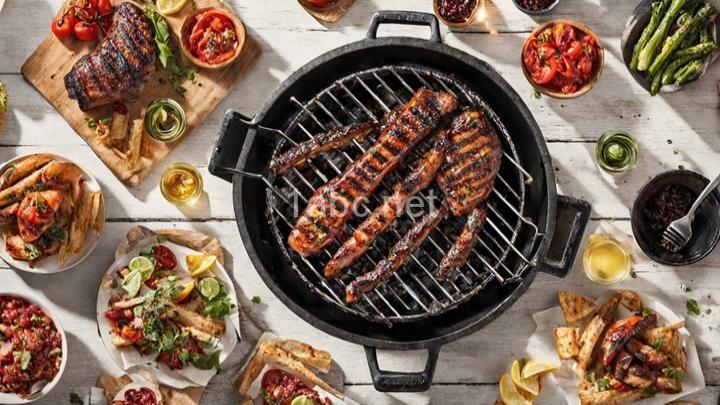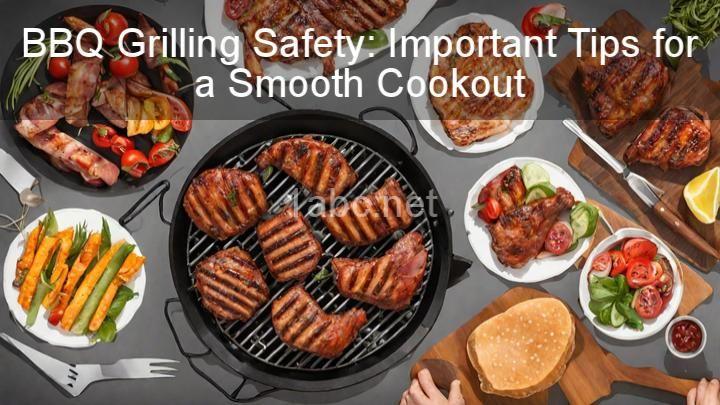The Ultimate Grilling Guide: Charcoal or Gas - Which Suits Your Style?

Hey there, grilling enthusiasts! Welcome to the ultimate grilling guide where we'll help you decide between the age-old debate of charcoal or gas grills. Whether you're a seasoned grill master or just starting out, we've got you covered. Let's dive in and explore the world of grilling to find the perfect match for your style and preferences.
I. Understanding Charcoal Grills:
Let's start with the classic charcoal grill. There's just something about that smoky flavor that can't be beaten. Charcoal grills are the epitome of traditional grilling, and they offer a unique cooking experience. These grills work by using charcoal briquettes as fuel and proper ventilation for heat control. The charcoal creates a high, even heat that is perfect for searing and achieving that delicious char on your meats. Plus, charcoal grills allow for various cooking styles, from direct grilling to smoking.
II. Discovering Gas Grills:
Now, let's take a look at the alternative option - gas grills. Gas grills have gained popularity for their convenience and ease of use. They operate using either propane or natural gas as fuel sources. With a simple turn of a knob, you can control the heat and get grilling in no time. Gas grills offer a quick heat-up time, precise temperature control, and easy cleanup, making them perfect for those who want a hassle-free grilling experience.
III. Comparing Charcoal vs. Gas Grills:
Now that we've explored both types of grills, let's compare them side by side. When it comes to flavor, charcoal grills win the battle. The smoky taste infused into your food is something that gas grills can't replicate. However, gas grills excel in terms of convenience. They heat up quickly and allow for precise temperature control, which is great for those who value time and precision in their cooking.
Cost-wise, charcoal grills tend to be more affordable upfront, with gas grills requiring a higher initial investment. However, gas grills may prove to be more cost-effective in the long run, as you won't need to purchase charcoal briquettes. When it comes to versatility, charcoal grills take the crown. You can experiment with different charcoal types, smoking techniques, and cooking styles. Gas grills, while not as versatile, offer a wide range of cooking options and are perfect for everyday grilling.
Maintenance-wise, charcoal grills require more effort. You'll need to clean out the ash regularly and ensure proper ventilation. Gas grills, on the other hand, are relatively low-maintenance, with easy-to-clean surfaces and no ashes to deal with.
IV. Choosing Your Grill:
Now that we've weighed the pros and cons, how do you choose the right grill for yourself? Consider your budget, available space, frequency of use, desired flavors, and cooking style preferences. If you're on a tight budget or love that smoky flavor, a charcoal grill might be the way to go. If convenience and quick grilling sessions are more your style, a gas grill would suit you perfectly. Remember, there's no right or wrong choice here. It all boils down to what works best for you.
V. Maintenance & Safety Tips:
To ensure your grill lasts for years to come, proper maintenance is essential. For charcoal grills, regularly clean out the ash and make sure the vents are clear for optimal airflow. Gas grills should be cleaned after each use, and the burners should be inspected for any blockages. Safety should also be a top priority. If you use a gas grill, make sure to store propane tanks properly and check for any leaks. For charcoal grills, dispose of used charcoal safely and away from flammable materials.
Conclusion:
We've covered a lot of ground in this grilling guide, and we hope it has helped you make an informed decision. Whether you choose charcoal or gas, remember that grilling is all about having fun and enjoying the process. So fire up that grill, gather your friends and family, and create some mouthwatering meals. Happy grilling!
And if you have any questions or need further assistance, feel free to reach out. We're here to help you on your grilling journey. Cheers!
FREQUENTLY ASKED QUESTIONS
What are the advantages of using charcoal for grilling?
Using charcoal for grilling offers several advantages that make it a popular choice among outdoor cooking enthusiasts. Let's explore some of these benefits:
-
Enhanced Flavor: One of the main advantages of using charcoal is the smoky flavor it imparts on the food. Charcoal produces a unique taste that adds depth and complexity to your grilled dishes, creating a mouthwatering experience for your taste buds.
-
High Heat Output: Charcoal burns at a higher temperature compared to other grilling fuels, such as propane or natural gas. This intense heat allows for fast and efficient cooking, searing the outside of the food to lock in juices while keeping the inside tender and flavorful.
-
Versatility: Charcoal grills offer great versatility when it comes to cooking techniques. With the ability to control the placement and intensity of the coals, you can create different heat zones on the grill. This allows for direct grilling, indirect grilling, smoking, and even using a combination of these methods for more complex recipes.
-
Portability: Charcoal grills are typically more portable compared to their gas counterparts. They don't require a constant fuel source, making them ideal for outdoor adventures, camping trips, or tailgating events. Simply pack up your grill, charcoal, and some lighter fluid, and you're ready to go.
-
Cost-effective: Charcoal grills are generally more affordable than gas grills, making them accessible to a wider range of budgets. Additionally, charcoal itself is cheaper and readily available in most stores, making it a cost-effective fuel option for regular grilling.
-
Traditional Experience: Grilling with charcoal brings a sense of tradition and nostalgia to outdoor cooking. It allows you to connect with the age-old art of grilling over an open fire, giving you a unique and authentic grilling experience.
While charcoal grilling offers these advantages, it's worth noting that it requires some skill and patience to master the techniques involved. However, with practice and a little experimentation, you can create delicious and memorable meals that will leave your guests asking for more.
Is it difficult to light charcoal for grilling?
Lighting charcoal for grilling can be a bit challenging at first, but with the right techniques and tools, it becomes easier. The difficulty level may vary depending on the method you choose to light your charcoal.If you opt for the traditional method of using lighter fluid, it can be a straightforward process. Simply arrange your charcoal in a pyramid shape, soak it with lighter fluid, and then carefully ignite it. However, it's important to exercise caution when handling lighter fluid, as it is flammable.
Alternatively, you can use a chimney starter, which is a popular and efficient method. Place crumpled newspaper or fire starters at the bottom of the chimney, followed by charcoal on top. Light the newspaper or fire starters, and the heat will rise, igniting the charcoal. This method eliminates the need for lighter fluid and ensures a more even distribution of heat.
Some people also use an electric charcoal starter, which is a convenient option. This device plugs into an electrical outlet and heats up, allowing you to place it directly into the charcoal. It ignites the charcoal without the need for flames or lighter fluid.
While lighting charcoal for grilling may require a bit of practice, it becomes easier with experience. It's important to follow safety guidelines and choose the method that suits you best. So, don't worry if it seems difficult at first – with the right approach, you'll be grilling delicious food in no time!
Can I use wood chips with a gas grill?
Yes, you can definitely use wood chips with a gas grill! Adding wood chips to your gas grill can infuse your food with a delicious smoky flavor, similar to that of a traditional charcoal grill. This technique is often called "gas grilling with wood chips" or "smoking on a gas grill."To use wood chips with your gas grill, there are a few simple steps you can follow:
-
Soak the wood chips: Before using the wood chips, it's recommended to soak them in water for about 30 minutes to an hour. This helps to prevent them from burning too quickly and produces more smoke.
-
Prepare the grill: Preheat your gas grill to the desired temperature. While the grill is heating up, you can use a smoker box, aluminum foil pouch, or even a small aluminum pan to hold the soaked wood chips.
-
Add the wood chips: Once the grill is hot, place the soaked wood chips directly onto the heat source or in the smoker box. If you're using an aluminum foil pouch, simply poke a few holes in it to allow the smoke to escape. Make sure to place the wood chips close to the burners for optimal smoke production.
-
Start grilling: Now that the wood chips are in place, you can start grilling your food as usual. The smoke from the wood chips will add that delicious smoky flavor to your dishes. Just remember to keep an eye on the temperature and adjust as needed.
-
Experiment with different wood flavors: One of the great things about using wood chips is the variety of flavors you can experiment with. Different types of wood, such as hickory, mesquite, cherry, or apple, can impart unique flavors to your grilled food. Feel free to try different combinations and find your favorite!
Using wood chips with a gas grill allows you to enjoy the convenience and control of gas grilling while still getting that coveted smoky flavor. So go ahead and give it a try on your next grilling adventure!
